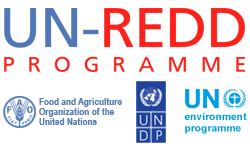
Open Tenure Software Paves The Way for Land Tenure Security in the DRC and Colombia
Land tenure security is widely recognized as a key condition for reducing deforestation and forest degradation. Clarifying and securing land tenure rights can be a complex and challenging process, particularly in countries with customary systems of ownership where information on rights and rights-holders is typically not written down. In some cases, overlapping tenure rights add to these challenges. To address these complex issues, the Food and Agriculture Organization of the United Nations (FAO), within the framework of the UN-REDD Programme, held practical training courses on Open Tenure in the Democratic Republic of the Congo and in Colombia, empowering local trainers with the skills to host their own training sessions for their communities.
Open Tenure is a tablet or smartphone-based software developed by FAO for field data collection. It works together with a web-based application (community server) to process the collected field data and register claims. This software is freely available and recently updated. In its design, Open Tenure takes into account all of the intricacies of land tenure rights documentation, making it relatively easy for users to gather and organize digital land tenure data. Once the data is collected, Open Tenure generates a report containing all of the relevant information on the claim and claimants, including a small map. If integrated with a process for the recognition of legitimate tenure rights, these claim reports can be compiled and submitted towards formal legal tenure rights registration or held as an internal community document to support better land and resource management.
The Open Tenure tool can be adapted to the local context to meet diverse needs and align with existing legal frameworks. In the DRC, civil society participants envision using the tool to demarcate new local community forestry concessions. In Colombia, the partner Afro descendent community, COCOMASUR, aims to use Open Tenure to support land use planning and forest governance.
The training courses in DRC and Colombia represent the launch of further on-the-ground efforts to secure tenure rights for smallholders living in these forest contexts. In the words of Dauphin Lomboto, Technical Advisor to the Ministry of Environment, “Open Tenure should be for everyone as it can contribute to our country’s development.”
UN-REDD will continue to provide technical support and monitor progress towards securing tenure rights in these diverse contexts.

